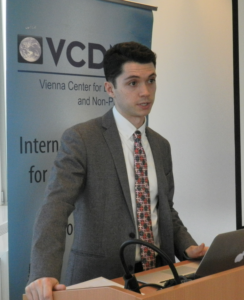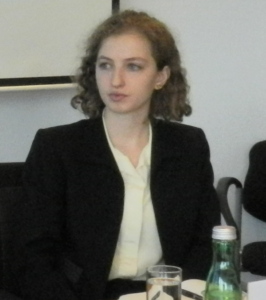
On Wednesday, 7 November 2018, the Center for Advanced Defense Studies (C4ADS) and the VCDNP held a seminar entitled “Illicit Networks and Proliferation in the Age of Open Data,” which addressed the complex work of using disparate data sets to help identify illicit activity operating within legitimate systems. C4ADS Senior Analyst Jack Margolin and Analyst Irina Bukharin use open-source data to track activities such as the transfer of sensitive materials, knowledge and technology, as well as the evasion of proliferation-related sanctions.
Through the use of software tools, such as Palantir Gotham, and the analysis of corporate records and other publicly available data, Mr. Margolin and Ms. Bukharin demonstrated how C4ADS tracks illicit activity that malicious actors attempt to conceal. Using these methods, C4ADS has, to date, contributed to the sanctions designations of 36 companies and individuals, the seizure of 1,400 tonnes of contraband and the disruption of over $2.7 billion of funds associated with illicit activity.

To illustrate the utility of their work, Mr. Margolin and Ms. Bukharin presented a case study on North Korean sanctions evasion. Mr. Margolin opened the case study by asking “How does the regime circumvent multilateral non-proliferation sanctions?” and stated that, “like other illicit networks, they conceal their activity within a global web of overseas financing and procurement networks.”
C4ADS analysts began by studying the legal networks in which the North Korean government operates, chiefly trade with China, which comprises approximately 85 to 90 percent of North Korea’s total trade. In reviewing all of the trade records over the past five years between China and North Korea, more than half a million lines of data, C4ADS experts were able to narrow the search down to approximately 5,000 companies. From there, C4ADS analysts tracked each of the companies’ official Chinese business registers and found shared properties between them, which resulted in a list of 12,000 total entities, including companies, directors and shareholders.
Once C4ADS was able to compile this snapshot of the legitimate Chinese trade environment, analysts began to search for illicit activity within it. They partnered with experts from the James Martin Center for Nonproliferation Studies (CNS) and selected 10 Harmonized System (HS) codes to identify which traded material is potentially a dual-use item. While trade of these items does not necessarily indicate illegal activity or proliferation, it does imply potential risk of such activity. By applying a filter using the 10 identified HS codes to the existing trade database, C4ADS was able to narrow the list further from 5,000 to only 32 companies. C4ADS uses a similar methodological approach in most of its cases, usually beginning with the entire licit network and then narrowing down from there, observed Ms. Bukharin. Once the dataset had been reduced through software to 32 companies, analysts were finally able to work with the data itself to draw conclusions.
From the dataset, C4ADS and CNS were able to determine that a particular Chinese company had shipped $790,000 of “radar apparatus” to a North Korean company in June 2016. According to experts at CNS, this technology could be used in ballistic missiles. Further investigation yielded one man’s name in particular – Sun Sidong – who owned the Chinese company in question, as well as operated as a shareholder in several others companies known to ship dual-use items. Additionally, C4ADS dug into Mr. Sun’s holdings and found that he was the sole shareholder of a company that owned a cargo ship that was seized in 2016 for its role in North Korean weapons trafficking, including 30,000 rocket-propelled grenades. Once C4ADS concluded that Mr. Sun’s company was both the largest supplier of dual-use items to North Korea and verifiably linked to weapons trafficking, it presented this data to United States (US) government authorities.
Two months later, the US Department of Justice froze Mr. Sun’s company’s US assets and the US Treasury included the company on its sanctions list “targeting those who support the advancement of nuclear and ballistic missile programs, and isolating them from the American financial system.”

In this case, C4ADS was able to assist the US government in stopping the DPRK from conducting trafficking activities. Mr. Margolin and Ms. Bukharin emphasised that, despite the high profile nature of this case, the process of analysis is virtually the same with most of their cases, which encompass a wide range of industries, including illicit trafficking and sanctions evasion, as well as environmental crimes, such as illegal fishing and logging.
After their presentation, the audience was given the opportunity to ask questions. The discussion focused heavily on the impact of C4ADS’ work internationally and how C4ADS might cooperate with other organisations in the future. In particular, participants discussed the partnerships that C4ADS holds with the US government, as well as UN organisations and other think tanks. One participant asked as to whether C4ADS’ analysts had ever been victims of retaliation after naming an individual or government in relation to sanctioned activity. Mr. Margolin and Ms. Bukharin responded that C4ADS always contacts any individual, company or government before naming them publicly and allows them to dispute or clarify their alleged activity. Sometimes these entities respond and are able to transparently demonstrate that no illicit activity has occurred. Other times, C4ADS receives no response at all. Finally, Mr. Margolin and Ms. Bukharin discussed the importance of collaboration in the field of analysis. Different groups have different sets of expertise and can make further strides if they rely on one another.